初中英语时态总结
初中英语16种时态表格总结

一般现在时表示经常发生的动作或存在的状态主语+动词原形/动词第三人称单数形式She often goes to school by bike.一般过去时表示过去发生的动作或存在的状态主语+动词过去式He played football yesterday.一般将来时表示将要发生的动作或存在的状态主语+will/shall+动词原形We will have a party next week.现在进行时表示正在进行的动作主语+am/is/are+动词-ing 形式They are playing basketball now.过去进行时表示过去某一时刻正在进行的动作主语+was/were+动词-ing 形式She was reading a book when I camein.将来进行时表示将来某一时刻正在进行的动作主语+will/shall+be+动词-ing 形式They will be having a meeting at thistime tomorrow.现在完成时表示过去发生的动作对现在造成的影响或结果主语+have/has+过去分词I have already finished my homework.过去完成时表示过去某一时刻之前已经完成的动作主语+had+过去分词He had left before I arrived.将来完成时表示将来某一时刻之前已经完成的动作主语+will/shall+have+过去分词They will have finished the project bythe end of this month.现在完成进行时表示过去某一动作一直持续到现在主语+have/has+been+动词-ing 形式I have been learning English for tenyears.过去完成进行时表示过去某一动作一直持续到过去某一时刻主语+had+been+动词-ing 形式She had been working for eight hoursby the time I arrived.将来完成进行时表示将来某一动作一直持续到将来某一时刻主语+will/shall+have+been+动词-ing 形式They will have been working on theproject for two years by the end ofnext month.过去将来时表示过去某一时刻之后将要发生的动作主语+would/should+动词原形He said he would come back the nextday.过去将来进行时表示过去某一时刻之后将要进行的动作主语+would/should+be+动词-ing 形式She said she would be working on theproject at that time.过去将来完成时表示过去某一时刻之后将要完成的动作主语+would/should+have+过去分词He said he would have finished thework by the end of the week.。
初中英语的时态知识点总结
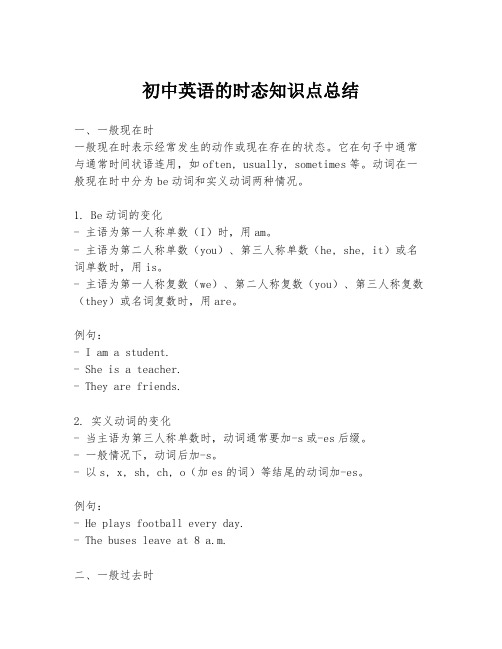
初中英语的时态知识点总结一、一般现在时一般现在时表示经常发生的动作或现在存在的状态。
它在句子中通常与通常时间状语连用,如often, usually, sometimes等。
动词在一般现在时中分为be动词和实义动词两种情况。
1. Be动词的变化- 主语为第一人称单数(I)时,用am。
- 主语为第二人称单数(you)、第三人称单数(he, she, it)或名词单数时,用is。
- 主语为第一人称复数(we)、第二人称复数(you)、第三人称复数(they)或名词复数时,用are。
例句:- I am a student.- She is a teacher.- They are friends.2. 实义动词的变化- 当主语为第三人称单数时,动词通常要加-s或-es后缀。
- 一般情况下,动词后加-s。
- 以s, x, sh, ch, o(加es的词)等结尾的动词加-es。
例句:- He plays football every day.- The buses leave at 8 a.m.二、一般过去时一般过去时表示过去某一确定时间发生的动作或存在的状态。
动词在一般过去时中要变为过去式,一般在词尾加-ed。
1. 规则变化- 动词词尾加-ed(如:played, visited)。
- 以e结尾的动词加-d(如:lived, danced)。
- 以辅音字母+y结尾的动词,变y为i再加-ed(如:studied, copied)。
2. 不规则变化不规则动词的过去式变化没有固定规则,需要特别记忆。
例如:- go去了went。
- eat吃了ate。
- begin开始began。
三、一般将来时一般将来时表示将来某一时间会发生的动作或状态。
它的构成主要有以下几种方式。
1. 将will或shall加在动词原形之前。
- I will go to school tomorrow.- He shall finish the work.2. 用“be going to + 动词原形”表示计划或打算做的事情。
初中英语时态总结表
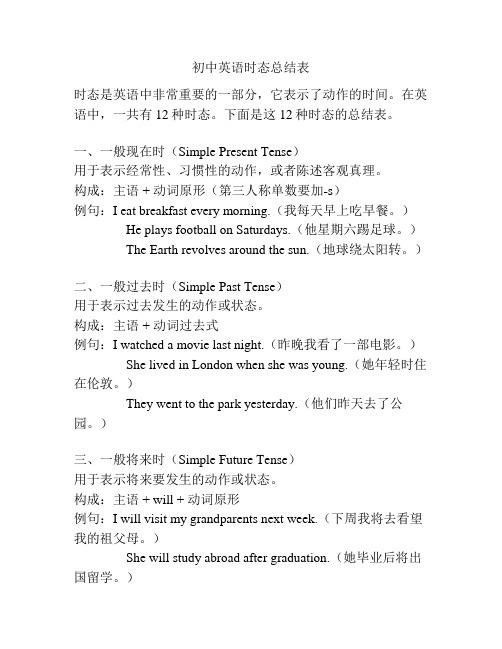
初中英语时态总结表时态是英语中非常重要的一部分,它表示了动作的时间。
在英语中,一共有12种时态。
下面是这12种时态的总结表。
一、一般现在时(Simple Present Tense)用于表示经常性、习惯性的动作,或者陈述客观真理。
构成:主语 + 动词原形(第三人称单数要加-s)例句:I eat breakfast every morning.(我每天早上吃早餐。
)He plays football on Saturdays.(他星期六踢足球。
)The Earth revolves around the sun.(地球绕太阳转。
)二、一般过去时(Simple Past Tense)用于表示过去发生的动作或状态。
构成:主语 + 动词过去式例句:I watched a movie last night.(昨晚我看了一部电影。
)She lived in London when she was young.(她年轻时住在伦敦。
)They went to the park yesterday.(他们昨天去了公园。
)三、一般将来时(Simple Future Tense)用于表示将来要发生的动作或状态。
构成:主语 + will + 动词原形例句:I will visit my grandparents next week.(下周我将去看望我的祖父母。
)She will study abroad after graduation.(她毕业后将出国留学。
)They will have a party on Friday.(他们将在星期五举行一个派对。
)四、现在进行时(Present Continuous Tense)用于表示现在正在进行的动作。
构成:主语 + am/is/are + 现在分词(-ing形式)例句:I am reading a book now.(我现在在读一本书。
)She is playing the piano at the moment.(她此刻正在弹钢琴。
初中所有英语时态
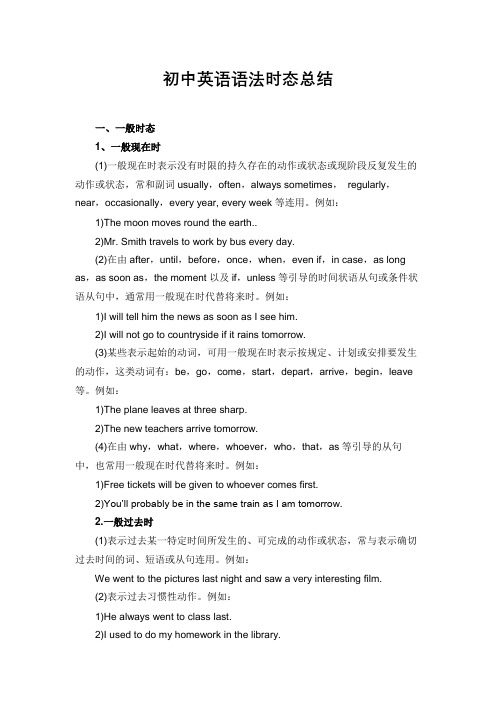
初中英语语法时态总结一、一般时态1、一般现在时(1)一般现在时表示没有时限的持久存在的动作或状态或现阶段反复发生的动作或状态,常和副词usually,often,always sometimes,regularly,near,occasionally,every year, every week等连用。
例如:1)The moon moves round the earth..2)Mr. Smith travels to work by bus every day.(2)在由after,until,before,once,when,even if,in case,as long as,as soon as,the moment以及if,unless等引导的时间状语从句或条件状语从句中,通常用一般现在时代替将来时。
例如:1)I will tell him the news as soon as I see him.2)I will not go to countryside if it rains tomorrow.(3)某些表示起始的动词,可用一般现在时表示按规定、计划或安排要发生的动作,这类动词有:be,go,come,start,depart,arrive,begin,leave 等。
例如:1)The plane leaves at three sharp.2)The new teachers arrive tomorrow.(4)在由why,what,where,whoever,who,that,as等引导的从句中,也常用一般现在时代替将来时。
例如:1)Free tickets will be given to whoever comes first.2)You’ll probably be in the same train as I am tomorrow.2.一般过去时(1)表示过去某一特定时间所发生的、可完成的动作或状态,常与表示确切过去时间的词、短语或从句连用。
初中英语八大时态归纳总结
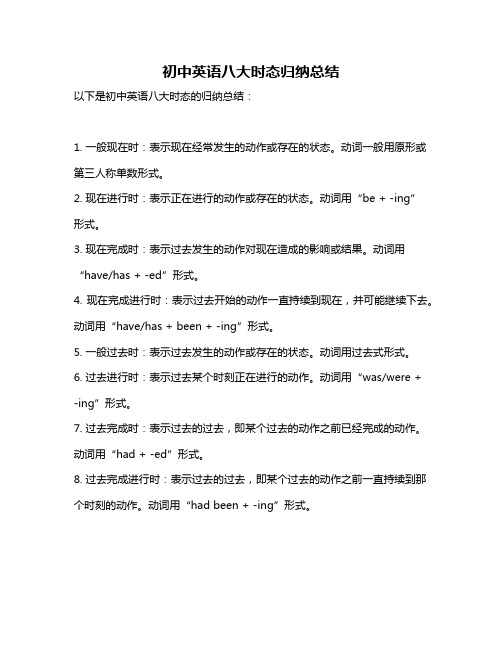
初中英语八大时态归纳总结
以下是初中英语八大时态的归纳总结:
1. 一般现在时:表示现在经常发生的动作或存在的状态。
动词一般用原形或第三人称单数形式。
2. 现在进行时:表示正在进行的动作或存在的状态。
动词用“be + -ing”
形式。
3. 现在完成时:表示过去发生的动作对现在造成的影响或结果。
动词用“have/has + -ed”形式。
4. 现在完成进行时:表示过去开始的动作一直持续到现在,并可能继续下去。
动词用“have/has + been + -ing”形式。
5. 一般过去时:表示过去发生的动作或存在的状态。
动词用过去式形式。
6. 过去进行时:表示过去某个时刻正在进行的动作。
动词用“was/were + -ing”形式。
7. 过去完成时:表示过去的过去,即某个过去的动作之前已经完成的动作。
动词用“had + -ed”形式。
8. 过去完成进行时:表示过去的过去,即某个过去的动作之前一直持续到那个时刻的动作。
动词用“had been + -ing”形式。
以上是初中英语的八大时态,理解和掌握这些时态对于英语学习和交流非常重要。
初中英语8个时态归纳总结
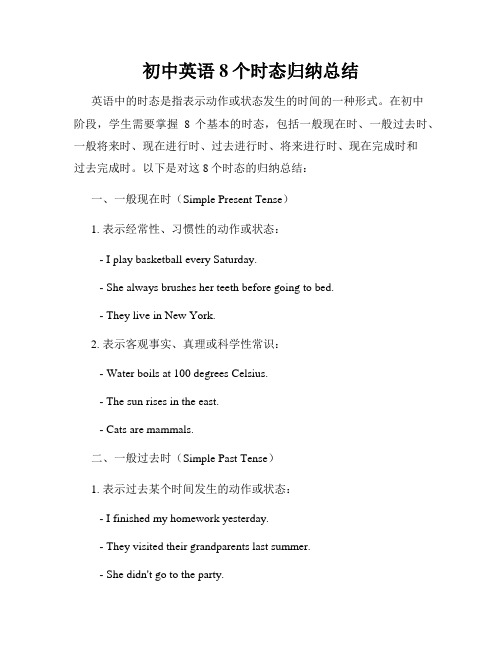
初中英语8个时态归纳总结英语中的时态是指表示动作或状态发生的时间的一种形式。
在初中阶段,学生需要掌握8个基本的时态,包括一般现在时、一般过去时、一般将来时、现在进行时、过去进行时、将来进行时、现在完成时和过去完成时。
以下是对这8个时态的归纳总结:一、一般现在时(Simple Present Tense)1. 表示经常性、习惯性的动作或状态:- I play basketball every Saturday.- She always brushes her teeth before going to bed.- They live in New York.2. 表示客观事实、真理或科学性常识:- Water boils at 100 degrees Celsius.- The sun rises in the east.- Cats are mammals.二、一般过去时(Simple Past Tense)1. 表示过去某个时间发生的动作或状态:- I finished my homework yesterday.- They visited their grandparents last summer.- She didn't go to the party.2. 表示过去的经历或习惯:- When I was young, I often went swimming. - He always ate breakfast at 8 o'clock.三、一般将来时(Simple Future Tense)1. 表示将来要发生的动作或事件:- I will go shopping tomorrow.- They are going to have a picnic next week. - She won't be late for the meeting.2. 表示将来的打算或意愿:- I am going to be a doctor when I grow up.- We will help you with your project.四、现在进行时(Present Continuous Tense)1. 表示现在正在进行的动作:- We are studying English at the moment.- He is playing soccer with his friends.- They aren't watching TV right now.2. 表示现阶段的趋势或变化:- The population is increasing rapidly.- More and more people are using smartphones.五、过去进行时(Past Continuous Tense)1. 表示过去某一时间段内正在进行的动作:- I was reading a book when the phone rang.- They were cooking dinner at 7 o'clock.2. 表示过去的同时发生的两个动作:- She was listening to music while doing her homework.六、将来进行时(Future Continuous Tense)1. 表示将来某一时间段内正在进行的动作:- Tomorrow, they will be flying to Paris.- I will be waiting for you at the station.2. 表示将来的预测或计划:- This time next month, I will be studying for my exams.七、现在完成时(Present Perfect Tense)1. 表示过去某一时间发生的动作对现在造成的影响或结果: - I have finished my homework, so I can watch TV now.- She has already eaten lunch.2. 表示过去某一时间内多次发生的动作:- We have visited that museum several times.八、过去完成时(Past Perfect Tense)1. 表示过去某一时间点之前已经完成的动作:- By the time they arrived, we had already left.- I had finished my work before the deadline.2. 表示过去的顺序或先后关系:- She realized that she had forgotten her keys after she locked the door.以上是初中英语的8个时态的归纳总结。
初中英语必备常见时态解析与用法总结
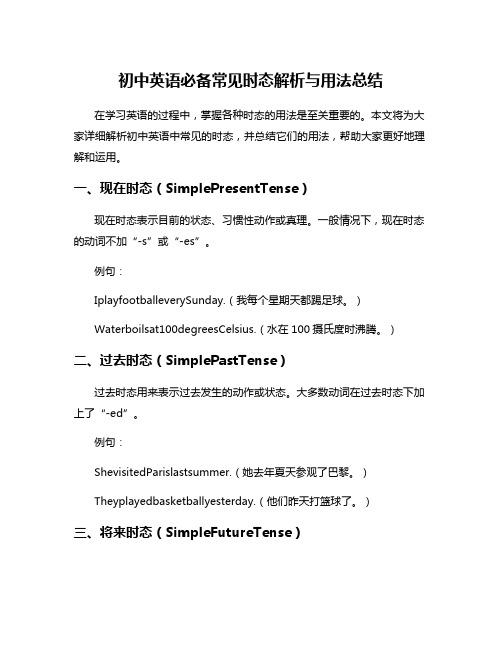
初中英语必备常见时态解析与用法总结在学习英语的过程中,掌握各种时态的用法是至关重要的。
本文将为大家详细解析初中英语中常见的时态,并总结它们的用法,帮助大家更好地理解和运用。
一、现在时态(SimplePresentTense)现在时态表示目前的状态、习惯性动作或真理。
一般情况下,现在时态的动词不加“-s”或“-es”。
例句:IplayfootballeverySunday.(我每个星期天都踢足球。
)Waterboilsat100degreesCelsius.(水在100摄氏度时沸腾。
)二、过去时态(SimplePastTense)过去时态用来表示过去发生的动作或状态。
大多数动词在过去时态下加上了“-ed”。
例句:ShevisitedParislastsummer.(她去年夏天参观了巴黎。
)Theyplayedbasketballyesterday.(他们昨天打篮球了。
)三、将来时态(SimpleFutureTense)将来时态表示将来要发生的动作或状态。
常用的表达方式是使用助动词“will”。
例句:Iwillgoshoppingtomorrow.(我明天要去购物。
)Shewillstudyhardfortheexam.(她将为考试努力学习。
)四、现在进行时态(PresentContinuousTense)现在进行时态表示现在正在进行的动作。
构成方式为“主语+am/is/are+现在分词”。
例句:Theyareplayingsoccerinthepark.(他们正在公园里踢足球。
)Sheisreadingabookrightnow.(她现在正在看书。
)五、过去进行时态(PastContinuousTense)过去进行时态表示过去某一时刻正在进行的动作。
构成方式为“was/were+现在分词”。
例句:Iwasstudyingwhenthephonerang.(电话响时我正在学习。
)Theywereplayingchessatthattime.(他们那时在下国际象棋。
初中英语八大时态总结
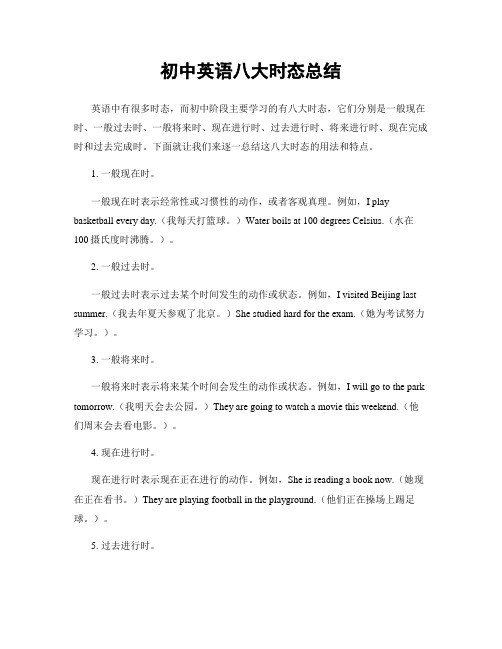
初中英语八大时态总结英语中有很多时态,而初中阶段主要学习的有八大时态,它们分别是一般现在时、一般过去时、一般将来时、现在进行时、过去进行时、将来进行时、现在完成时和过去完成时。
下面就让我们来逐一总结这八大时态的用法和特点。
1. 一般现在时。
一般现在时表示经常性或习惯性的动作,或者客观真理。
例如,I play basketball every day.(我每天打篮球。
)Water boils at 100 degrees Celsius.(水在100摄氏度时沸腾。
)。
2. 一般过去时。
一般过去时表示过去某个时间发生的动作或状态。
例如,I visited Beijing last summer.(我去年夏天参观了北京。
)She studied hard for the exam.(她为考试努力学习。
)。
3. 一般将来时。
一般将来时表示将来某个时间会发生的动作或状态。
例如,I will go to the park tomorrow.(我明天会去公园。
)They are going to watch a movie this weekend.(他们周末会去看电影。
)。
4. 现在进行时。
现在进行时表示现在正在进行的动作。
例如,She is reading a book now.(她现在正在看书。
)They are playing football in the playground.(他们正在操场上踢足球。
)。
5. 过去进行时。
过去进行时表示过去某个时间正在进行的动作。
例如,I was studying when she called me.(她给我打电话的时候,我正在学习。
)They were playing games at that time.(他们那时在玩游戏。
)。
6. 将来进行时。
将来进行时表示将来某个时间正在进行的动作。
例如,I will be having dinner at 7 o'clock tonight.(我今晚7点会在吃晚饭。
初中英语时态归纳总结

初中英语时态归纳总结英语时态是英语学习的重点和难点,尤其在初中阶段,掌握各种时态对于提高英语水平至关重要。
本文将对初中阶段需要掌握的英语时态进行归纳总结,帮助大家更好地理解和运用。
一、一般现在时1.动词原形:He likes playing football.2.动词三单:She studies English every day.3.现在进行时:They are watching TV now.4.每日习惯:I wake up at 6 o"clock every morning.二、一般过去时1.动词过去式:He visited his grandparents last week.2.过去进行时:They were playing chess when I came in.3.过去完成时:She had finished her homework before dinner.三、一般将来时1.动词原形:I will go to the library tomorrow.2.be going to:He is going to travel to Japan next month.3.现在进行时表将来:The plane is taking off in 10 minutes.四、现在进行时1.动词现在分词:She is reading a book.2.与always, constantly等词连用,表示频繁发生:My brother is always playing video games.五、过去进行时1.动词过去分词:They were discussing the project.2.与at that time, at this moment等词连用,表示在某个时间正在进行的动作:At that time, she was sleeping.六、完成时1.现在完成时:I have finished my homework.2.过去完成时:He had left the classroom before I arrived.七、被动语态1.一般现在时:The book is written by him.2.一般过去时:The window was broken by Tom.3.一般将来时:The letter will be sent to her tomorrow.总结:初中英语时态的学习需要掌握一般现在时、一般过去时、一般将来时、现在进行时、过去进行时、完成时和被动语态等。
初中英语时态总结
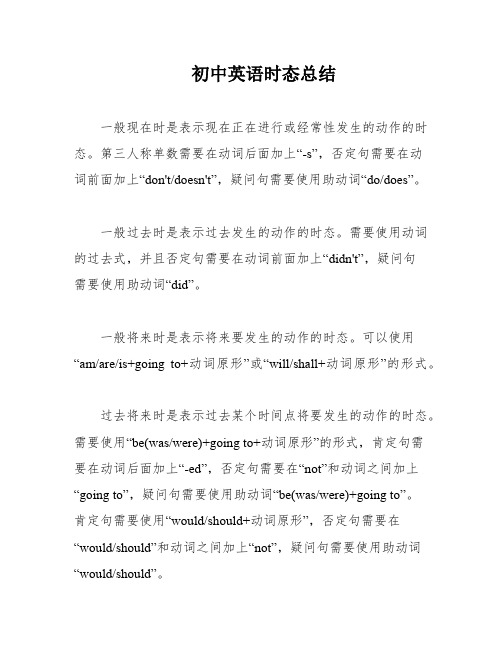
初中英语时态总结一般现在时是表示现在正在进行或经常性发生的动作的时态。
第三人称单数需要在动词后面加上“-s”,否定句需要在动词前面加上“don't/doesn't”,疑问句需要使用助动词“do/does”。
一般过去时是表示过去发生的动作的时态。
需要使用动词的过去式,并且否定句需要在动词前面加上“didn't”,疑问句需要使用助动词“did”。
一般将来时是表示将来要发生的动作的时态。
可以使用“am/are/is+going to+动词原形”或“will/shall+动词原形”的形式。
过去将来时是表示过去某个时间点将要发生的动作的时态。
需要使用“be(was/were)+going to+动词原形”的形式,肯定句需要在动词后面加上“-ed”,否定句需要在“not”和动词之间加上“going to”,疑问句需要使用助动词“be(was/were)+going to”。
肯定句需要使用“would/should+动词原形”,否定句需要在“would/should”和动词之间加上“not”,疑问句需要使用助动词“would/should”。
英语中有12个主要时态,分别来自于过去、现在和将来三个时间点。
以"I listen"为例,我们可以看到这些时态的不同表达方式:一般现在时:I listen现在进行时:I am XXX过去进行时:I was listening现在完成时:I have XXX除此之外,还有其他的时态,如过去完成时、将来完成时等等。
其中,有些时态需要借助助动词或时间状语来表达,如"by the end of"、"before"、"will have been doing"等。
需要注意的是,有些时态的表达方式比较相似,但含义上有所区别,如现在完成时和现在完成进行时。
初中英语语法八大时态总结完整版
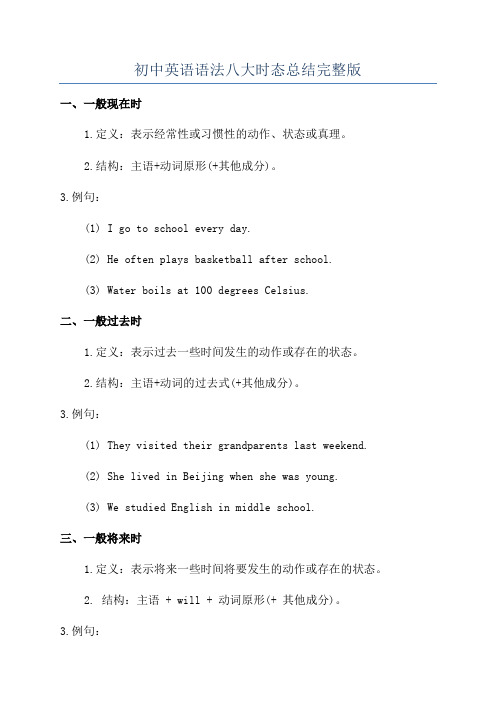
初中英语语法八大时态总结完整版一、一般现在时1.定义:表示经常性或习惯性的动作、状态或真理。
2.结构:主语+动词原形(+其他成分)。
3.例句:(1) I go to school every day.(2) He often plays basketball after school.(3) Water boils at 100 degrees Celsius.二、一般过去时1.定义:表示过去一些时间发生的动作或存在的状态。
2.结构:主语+动词的过去式(+其他成分)。
3.例句:(1) They visited their grandparents last weekend.(2) She lived in Beijing when she was young.(3) We studied English in middle school.三、一般将来时1.定义:表示将来一些时间将要发生的动作或存在的状态。
2. 结构:主语 + will + 动词原形(+ 其他成分)。
3.例句:(1) I will go to the park tomorrow.(3) We will have a party next week.四、现在进行时1.定义:表示现在正在进行的动作。
2. 结构:主语 + am/is/are + 动词-ing(+ 其他成分)。
3.例句:(1) She is reading a book right now.(2) They are playing soccer in the park.(3) We are having dinner at the moment.五、过去进行时1.定义:表示过去一些时间正在进行的动作。
2. 结构:主语 + was/were + 动词-ing(+ 其他成分)。
3.例句:(1) He was watching TV at 8 o'clock last night.(2) They were traveling in Europe during summer vacation.(3) We were studying when the phone rang.六、将来进行时1.定义:表示将来一些时间正在进行的动作。
初中英语语法八大时态总结(完整版)
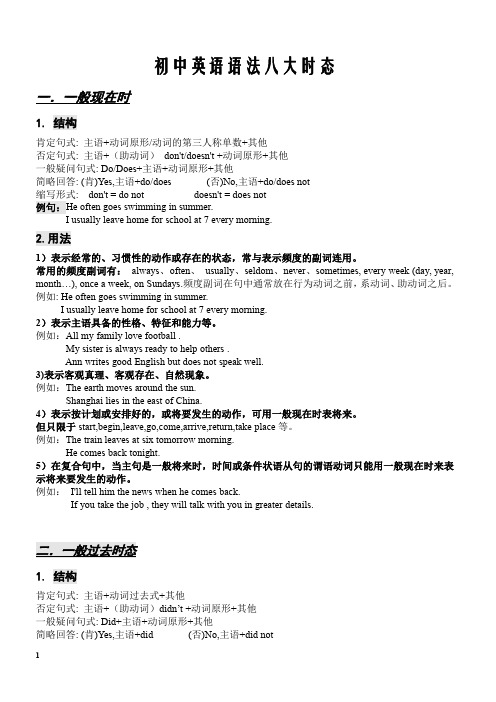
初中英语语法八大时态一.一般现在时1.结构肯定句式:主语+动词原形/动词的第三人称单数+其他否定句式:主语+(助动词)don't/doesn't+动词原形+其他一般疑问句式:Do/Does+主语+动词原形+其他简略回答:(肯)Yes,主语+do/does(否)No,主语+do/does not缩写形式:don't=do not doesn't=does not例句:He often goes swimming in summer.I usually leave home for school at7every morning.2.用法1)表示经常的、习惯性的动作或存在的状态,常与表示频度的副词连用。
常用的频度副词有:always、often、usually、seldom、never、sometimes,every week(day,year, month…),once a week,on Sundays.频度副词在句中通常放在行为动词之前,系动词、助动词之后。
例如:He often goes swimming in summer.I usually leave home for school at7every morning.2)表示主语具备的性格、特征和能力等。
例如:All my family love football.My sister is always ready to help others.Ann writes good English but does not speak well.3)表示客观真理、客观存在、自然现象。
例如:The earth moves around the sun.Shanghai lies in the east of China.4)表示按计划或安排好的,或将要发生的动作,可用一般现在时表将来。
但只限于start,begin,leave,go,come,arrive,return,take place等。
英语初中时态总结
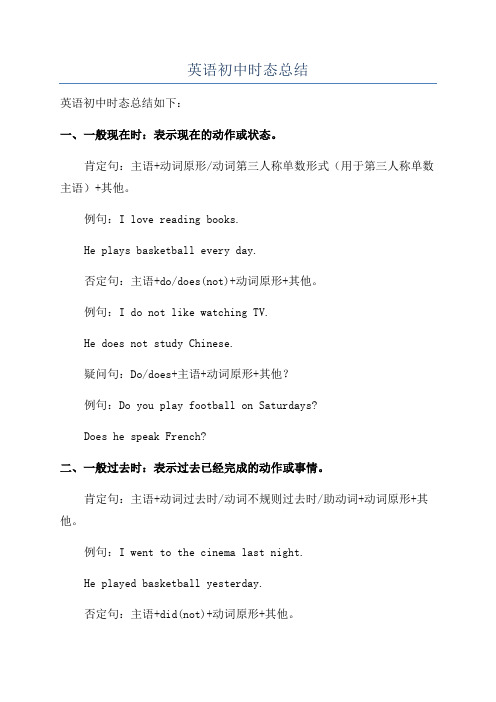
英语初中时态总结英语初中时态总结如下:一、一般现在时:表示现在的动作或状态。
肯定句:主语+动词原形/动词第三人称单数形式(用于第三人称单数主语)+其他。
例句:I love reading books.He plays basketball every day.否定句:主语+do/does(not)+动词原形+其他。
例句:I do not like watching TV.He does not study Chinese.疑问句:Do/does+主语+动词原形+其他?例句:Do you play football on Saturdays?Does he speak French?二、一般过去时:表示过去已经完成的动作或事情。
肯定句:主语+动词过去时/动词不规则过去时/助动词+动词原形+其他。
例句:I went to the cinema last night.He played basketball yesterday.否定句:主语+did(not)+动词原形+其他。
例句:I did not like the movie.He did not watch TV last night.疑问句:Did+主语+动词原形+其他?例句:Did you go to the party last night?Did he play basketball yesterday?三、现在进行时:表示现在正在进行或进行的动作。
肯定句:主语+be(am/is/are)+动词现在分词+其他。
例句:I am reading a book.He is playing basketball.否定句:主语+be(am/is/are(not))+动词现在分词+其他。
例句:I am not watching TV.He is not studying Chinese.疑问句:Be(am/is/are)+主语+动词现在分词+其他?例句:Are you playing football?Is he speaking French?四、过去进行时:表示过去一段时间内正在进行的动作。
初中英语八种基本时态总结
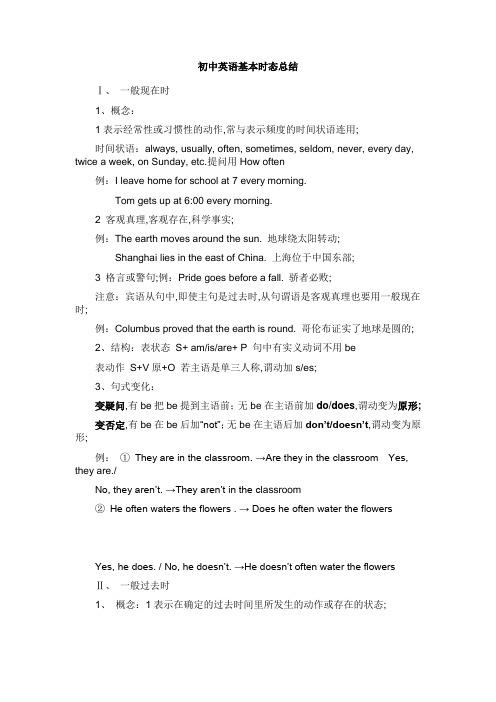
初中英语基本时态总结Ⅰ、一般现在时1、概念:1表示经常性或习惯性的动作,常与表示频度的时间状语连用;时间状语:always, usually, often, sometimes, seldom, never, every day, twice a week, on Sunday, etc.提问用How often例:I leave home for school at 7 every morning.Tom gets up at 6:00 every morning.2 客观真理,客观存在,科学事实;例:The earth moves around the sun. 地球绕太阳转动;Shanghai lies in the east of China. 上海位于中国东部;3 格言或警句;例:Pride goes before a fall. 骄者必败;注意:宾语从句中,即使主句是过去时,从句谓语是客观真理也要用一般现在时;例:Columbus proved that the earth is round. 哥伦布证实了地球是圆的;2、结构:表状态S+ am/is/are+ P 句中有实义动词不用be表动作S+V原+O 若主语是单三人称,谓动加s/es;3、句式变化:变疑问,有be把be提到主语前;无be在主语前加do/does,谓动变为原形;变否定,有be在be后加“not”;无be在主语后加don’t/doesn’t,谓动变为原形;例:①They are in the classroom. →Are they in the classroom Yes, they are./No, they aren’t. →They aren’t in the cl assroom②He often waters the flowers . → Does he often water the flowersYes, he does. / No, he doesn’t. →He doesn’t often water the flowersⅡ、一般过去时1、概念:1表示在确定的过去时间里所发生的动作或存在的状态;常用时间状语:yesterday, the day before yesterday, last week, just now, an hour ago, the other day, in 1982. at the age of 5, one day, long long ago, etc.例:Where did you go just now2表示在过去一段时间内,经常性或习惯性的动作;例:When I was a child, I often played football in the street.2、结构:表状态S+ was/were+ P表动作S+V过去式+O 注:句中有实义动词不用be3、句式变化:变疑问,有be把be提到主语前;无be在主语前加did,谓动变为原形;变否定,有be在be后直接加“not”;无be在主语后加didn’t,谓动变为原形.例:①She was in Xi’an last month. → Was she in Xi’an last monthYes, she was. /No, she wasn’t. →She wasn’t in Xi’an last month.②Danny grew a rose just now, → Did Danny grow a rose just nowYes, he did. / No, he didn’t. →Danny didn’t grow a rose just now,Ⅲ、现在进行时:1. 概念:表示现阶段或说话时正在进行的动作;时间状语:now, at this time, these days,以及有look, listen时;例:ListenThe birds are singing.2、结构:S + am/is/are + doing助动现在分词3、句式变化:变疑问,把am/is/are提到主语前;变否定,在am/is/are后直接加“not”;例:①I am writing a letter now. → Are you writing a letter nowYes, I am. /No, I’m not. →I am not writing a letter now. 注:am和not不能缩写;②The boys are playing football. → Are the boys playing footballYes, they are. / No, they aren’t. →The boys aren’t playing football.Ⅳ、过去进行时:1. 概念:表示过去某段时间或某一时刻正在发生或进行的动作;.时间状语:at this time yesterday, at that time,at 8:00 yesterday,或有when / while引导的时间状语从句等;例:We were having an English class at 9:30 yesterday morning.I was reading a book while my mother was watching TV.2、结构:S + was/were + doing3、句式变化:变疑问,把was/were提到主语前;变否定,在was/were后直接加“not”;例:①At that time they were working in the garden. → Were they working inthe garden at that timeYes, they were. / No, they weren’t.→At that time they were working in the garden.②When he came in, I was reading a newspaper. →When he came in, were you reading a newspaperYes, I was. / No, I wasn’t.→When he came in, I wasn’t reading a newspaper.Ⅴ、一般将来时1. 概念:表示将要发生的动作或存在的状态;时间词:tomorrow, tomorrow morning, at seven o'clock tomorrow evening, next year, this year, at the end of this term, from now,in ten minutes, in 2025例:They will do an experiment tomorrow afternoon.Brian is going to draw twenty pictures at the end of this term.2、结构:S +will+ V原+其他will 可改为be going to ,当主语是第一人称时will可用shall例:Which paragraph shall I read first 我先读哪一段呢Will you/Are you going tobe at home at seven this evening3、句式变化:变疑问,把will提到主语前;变否定,在will后直接加“not”;例; She will drive to Beijing next week. → Will she drive to Beijing next weekYes, she will. / No, she won’t. →She won’t drive to Beijing next week.★be going to + V原表示a. 主语的意图,即将做某事;例:What are you going to do tomorrowb. 计划,安排要发生的事;例:The play is going to be produced next month;c. 有迹象要发生的事;例:Look at the dark clouds, there is going to be a storm.★be +不定式:表示将来,按计划或正式安排将发生的事;例:We are to discuss the report next Saturday. 我们下星期六将讨论这份报告★用现在进行时表示将来come, go, arrive, leave, start, begin, return等终止性动词可用现在进行时表示将来;例:I'm leaving tomorrow. 明天我要走了;Are you staying here till next week 你会在这儿呆到下周吗Ⅶ、现在完成时:1. 表示:①过去发生或已经完成的动作对现在造成的影响或结果;时间词:ever, never, already, yet, before, just, recently/ lately最近, in the past few years2. ②或从过去已经开始持续到现在的动作或状态; 时间词:for + 时间段,since +过去时间点/从句;提问用How long例:The countryside has changed a lot in the past few years.He has learned French for two years.2.结构:S + have/has + done助动过去分词3. 句式变化:变疑问,把have/has提到主语前;变否定,在have/has后直接加“not”;例:①I've already written an article. → Have you written an article yet Yes, I h ave. / No, I haven’t. →I haven’t written an article yet.②Li Ming has lived in Shijiazhuang since 1993.→ Has Li Ming lived in Shijiazhuang since 1993 Yes, he has. / No, he hasn’t.→Li Ming hasn’t lived in Shijiazhuang since 1993.★比较一般过去时与现在完成时1一般过去时表示过去某具体时间发生的动作或单纯叙述过去的事情,强调动作;现在完成时则强调过去发生的动作对现在的造成影响,强调的是结果;2一般过去时常与具体的时间状语连用,而现在完成时通常与模糊的时间状语连用,或无时间状语;例:I saw this film yesterday. 强调看的动作发生过了I have seen this film. 强调对现在的影响,电影的内容已经知道了Why did you get up so early 强调起床的动作已发生过了Who hasn't handed in his paper 强调有卷子未交,指结果He joined the League three years ago. 强调加入这一动作He has been a League member for three years. 是团员的状态可持续句子中如有过去时的时间副词如yesterday, last, week, in 1960时,不能使用现在完成时,要用过去时;错Tom has written a letter to his parents last night.对Tom wrote a letter to his parents last night.。
初中英语知识点总结时态

初中英语知识点总结时态初中英语时态知识点总结一、一般现在时(Simple Present Tense)一般现在时用于描述经常发生的动作、状态或普遍真理。
其构成通常是主语加上动词的原形,第三人称单数时动词要加-es/-s。
例句:- She often reads books before going to bed.(她经常在睡觉前读书。
)- The sun rises in the east.(太阳从东方升起。
)二、现在进行时(Present Continuous Tense)现在进行时表示正在进行或发生的动作。
其构成是be动词(am/is/are)加上动词的现在分词(即动词原形加-ing)。
例句:- He is playing football now.(他现在正在踢足球。
)- They are studying for the math test.(他们正在为数学考试学习。
)三、一般过去时(Simple Past Tense)一般过去时用于描述在过去某个确定时间发生的动作或状态。
动词通常在词尾加-ed,不规则动词则有特殊变化形式。
例句:- I visited my grandparents last weekend.(上周末我拜访了我的祖父母。
)- He walked to school yesterday.(昨天他走路去学校。
)四、过去进行时(Past Continuous Tense)过去进行时表示在过去某个时间点或时间段内正在进行的动作。
其构成是was/were加上动词的现在分词。
例句:- She was reading a book when I called her.(我给她打电话时,她正在读书。
)- They were playing basketball at this time yesterday.(昨天这个时候,他们在打篮球。
)五、一般将来时(Simple Future Tense)一般将来时用于描述将要发生的动作或状态。
初中英语语法八大时态总结
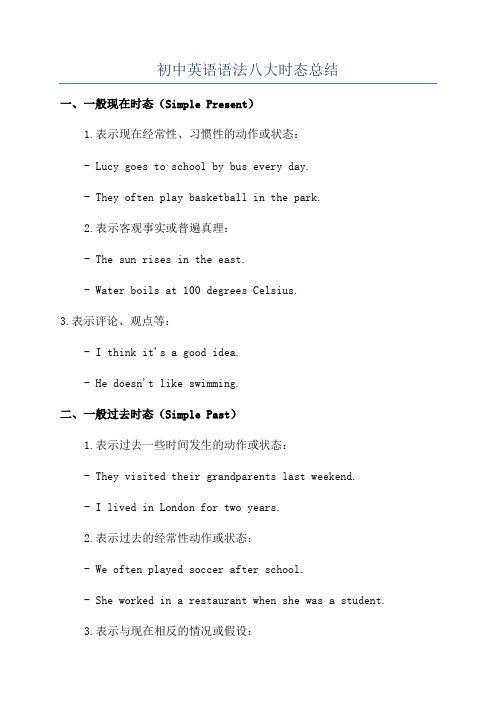
初中英语语法八大时态总结一、一般现在时态(Simple Present)1.表示现在经常性、习惯性的动作或状态:- Lucy goes to school by bus every day.- They often play basketball in the park.2.表示客观事实或普遍真理:- The sun rises in the east.- Water boils at 100 degrees Celsius.3.表示评论、观点等:- I think it's a good idea.- He doesn't like swimming.二、一般过去时态(Simple Past)1.表示过去一些时间发生的动作或状态:- They visited their grandparents last weekend.- I lived in London for two years.2.表示过去的经常性动作或状态:- We often played soccer after school.- She worked in a restaurant when she was a student.3.表示与现在相反的情况或假设:- If I had money, I would buy a new car.- I wish I could go to the concert with you.三、一般将来时态(Simple Future)1.表示将来要发生的事情:- I will meet him at the airport tomorrow.- They are going to have a party next week.2.表示意愿、打算或承诺:- I promise I will help you.- She is going to study abroad next year.四、现在进行时态(Present Continuous)1.表示现在正在进行或暂时的动作:- They are playing football in the park.- He is studying for the exam.2.表示现阶段的变化或趋势:- The population of the city is increasing rapidly.- More and more people are using smartphones.五、过去进行时态(Past Continuous)1.表示过去一些时间正在进行中的动作:- I was watching TV when she called me.- They were having dinner when the power went out.2.表示过去一些时间同时发生的两个动作:- While he was reading, his sister was playing the piano.- When I arrived, they were still waiting for you.六、将来进行时态(Future Continuous)1.表示将来一些时间正在进行的动作:- He will be sleeping when you arrive.2.表示将来一些时间同时发生的两个动作:- While you are washing the dishes, I will be cleaning the bathroom.- When I call you, she will be cooking dinner.七、现在完成时态(Present Perfect)1.表示过去发生但对现在有影响的动作或状态:- I have lost my key, so I can't open the door.- She has finished her homework, so she can watch TV now.2.表示经历或遭遇过的事情:- Have you ever been to Paris?- He has never seen such a beautiful sunset.八、过去完成时态(Past Perfect)1.表示在过去一些时间之前已经发生的动作或状态:- When I arrived, they had already left.2.表示过去一些时间之前一直存在或保持的状态:- He had lived in that house for 10 years before he moved out.- She had been planning the party for weeks.。
初中英语八大时态结构表总结
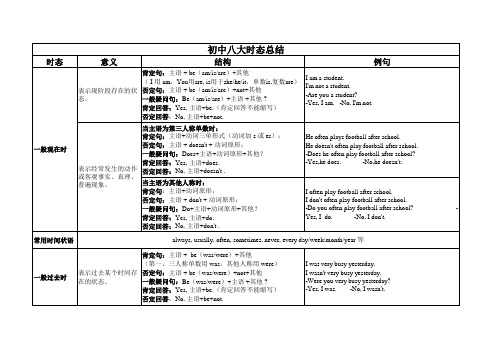
否
By the end of last year, we had learned 2000 English words.
常用时间状语 by the end of + 过去时间, before + 过去时间 等
常用时间状语
the next day/week/month/year 等
现在进行时
表示现在正在进行的 动作。
主语 + am/is/are + 现在分词(动词的 -ing 形式)
She is reading a book now. Listen! They are singing. We are having an English class at the moment.
-Have you finished your homework yet?
-Yes,I have.
-No, I haven't.
He has lived here since ten years ago.=He has lived here for ten years.
常用时间状语 already, yet, just, ever, never,so far= up tp now, since + 时间点, for + 时间段 等
过去将来时
从过去的某一时间来 would + 动词原形
看将来要发生的动作
或存在的状态。
was/were going to + 动词原形
He said he would come back the next day. They were going to visit the museum the following week.
初中英语时态句式归纳总结

初中英语时态句式归纳总结英语时态是表示动作发生的时间的一种语法形式。
在初中英语学习中,掌握不同时态的句式结构是非常重要的。
本文将总结初中英语时态的句式,以帮助同学们更好地掌握并运用时态。
一、一般现在时1. 肯定句:主语 + 动词原形(第三人称单数需要加-s)例: She walks to school every day.2. 否定句:主语 + do/does + not + 动词原形例: They do not watch TV in the morning.3. 一般疑问句:Do/Does + 主语 + 动词原形?例: Does he play basketball on weekends?4. 特殊疑问句:特殊疑问词 + 一般疑问句句式例: What does she do after school?二、一般过去时1. 肯定句:主语 + 动词过去式例: He visited his grandparents last weekend.2. 否定句:主语 + did not + 动词原形例: We did not finish our homework yesterday.3. 一般疑问句:Did + 主语 + 动词原形?例: Did they go to the park this morning?4. 特殊疑问句:特殊疑问词 + 一般疑问句句式例: When did you watch the movie?三、一般将来时1. 肯定句:主语 + will + 动词原形例: She will visit her friend next Sunday.2. 否定句:主语 + will not + 动词原形例: They will not go to the party tomorrow. 3. 一般疑问句:Will + 主语 + 动词原形?例: Will he help me with my homework?4. 特殊疑问句:特殊疑问词 + 一般疑问句句式例: How will they go to the zoo?四、现在进行时1. 肯定句:主语 + am/is/are + 动词-ing例: They are playing soccer in the park.2. 否定句:主语 + am/is/are + not + 动词-ing例: I am not watching TV right now.3. 一般疑问句:Am/Is/Are + 主语 + 动词-ing?例: Are you studying English at the moment?4. 特殊疑问句:特殊疑问词 + 一般疑问句句式例: What are they doing in the kitchen?五、过去进行时1. 肯定句:主语 + was/were + 动词-ing例: He was watching a movie at that time.2. 否定句:主语 + was/were + not + 动词-ing例: We were not studying last night.3. 一般疑问句:Was/Were + 主语 + 动词-ing?例: Were they playing basketball when you saw them?4. 特殊疑问句:特殊疑问词 + 一般疑问句句式例: What were you doing at 8 o'clock yesterday evening?六、将来进行时1. 肯定句:主语 + will be + 动词-ing例: She will be studying English at this time tomorrow.2. 否定句:主语 + will not be + 动词-ing例: They will not be working on the project next week.3. 一般疑问句:Will + 主语 + be + 动词-ing?例: Will you be waiting for me at the airport?4. 特殊疑问句:特殊疑问词 + 一般疑问句句式例: What will they be doing at this time next year?通过对初中英语时态句式的总结,希望可以帮助同学们更好地掌握和运用不同的时态,在写作和口语表达中能够准确地描述动作发生的时间。
初中英语时态语法总结
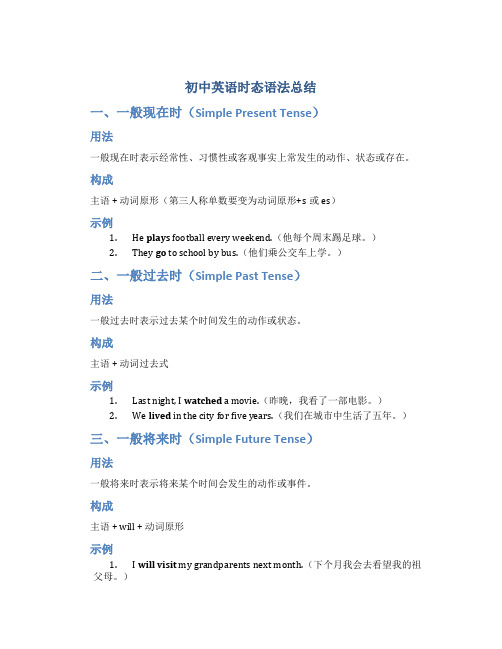
初中英语时态语法总结一、一般现在时(Simple Present Tense)用法一般现在时表示经常性、习惯性或客观事实上常发生的动作、状态或存在。
构成主语 + 动词原形(第三人称单数要变为动词原形+s或es)示例1.He plays football every weekend.(他每个周末踢足球。
)2.They go to school by bus.(他们乘公交车上学。
)二、一般过去时(Simple Past Tense)用法一般过去时表示过去某个时间发生的动作或状态。
构成主语 + 动词过去式示例st night, I watched a movie.(昨晚,我看了一部电影。
)2.We lived in the city for five years.(我们在城市中生活了五年。
)三、一般将来时(Simple Future Tense)用法一般将来时表示将来某个时间会发生的动作或事件。
构成主语 + will + 动词原形示例1.I will visit my grandparents next month.(下个月我会去看望我的祖父母。
)2.They will have a meeting tomorrow.(他们明天会开会。
)四、现在进行时(Present Continuous Tense)用法现在进行时表示现在正在进行或发生的动作。
构成主语 + am/is/are + 动词-ing形式示例1.We are studying English at the moment.(我们此刻正在学习英语。
)2.He is playing football in the park.(他正在公园里踢足球。
)五、过去进行时(Past Continuous Tense)用法过去进行时表示过去某个时间正在进行或发生的动作。
构成主语 + was/were + 动词-ing形式示例1.I was sleeping when you called me.(你给我打电话的时候,我正在睡觉。
英语时态初中归纳总结
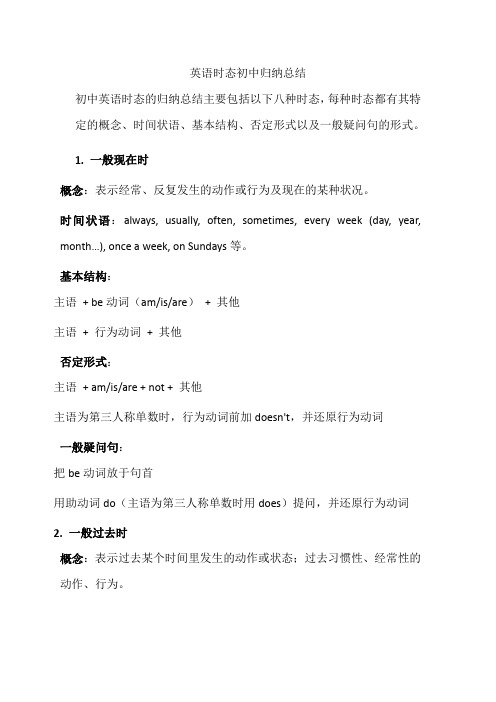
英语时态初中归纳总结初中英语时态的归纳总结主要包括以下八种时态,每种时态都有其特定的概念、时间状语、基本结构、否定形式以及一般疑问句的形式。
1. 一般现在时概念:表示经常、反复发生的动作或行为及现在的某种状况。
时间状语:always, usually, often, sometimes, every week (day, year, month…), once a week, on Sundays等。
基本结构:主语+ be动词(am/is/are)+ 其他主语+ 行为动词+ 其他否定形式:主语+ am/is/are + not + 其他主语为第三人称单数时,行为动词前加doesn't,并还原行为动词一般疑问句:把be动词放于句首用助动词do(主语为第三人称单数时用does)提问,并还原行为动词2. 一般过去时概念:表示过去某个时间里发生的动作或状态;过去习惯性、经常性的动作、行为。
时间状语:ago, yesterday, the day before yesterday, last week(year, night, month…), in 1989, just no w, at the age of 5, one day, long long ago, once upon a time等。
基本结构:主语+ be动词(was/were)+ 其他主语+ 行为动词(过去式)+ 其他否定形式:主语+ was/were + not + 其他在行为动词前加didn't,并还原行为动词一般疑问句:was或were放于句首用助动词do的过去式did提问,并还原行为动词3. 现在进行时概念:表示现阶段或说话时正在进行的动作及行为。
时间状语:now, at this time, these days等。
基本结构:主语+ am/is/are + doing + 其他否定形式:主语+ am/is/are + not + doing + 其他一般疑问句:把be动词放于句首4. 过去进行时概念:表示过去某段时间或某一时刻正在发生或进行的行为或动作。
- 1、下载文档前请自行甄别文档内容的完整性,平台不提供额外的编辑、内容补充、找答案等附加服务。
- 2、"仅部分预览"的文档,不可在线预览部分如存在完整性等问题,可反馈申请退款(可完整预览的文档不适用该条件!)。
- 3、如文档侵犯您的权益,请联系客服反馈,我们会尽快为您处理(人工客服工作时间:9:00-18:30)。
效佳教育杨凯勋英语中时态总共有16中,但就初中阶段而言,需要把握好其中的8中就可以了。
他们可分为三类:1.一般的:一般现在时,一般过去时,一般将来时。
2.现在的:现在进行时,现在完成时。
3.过去的:过去进行时,过去完成时,过去将来时。
那么我们下面就这三类来做一下详细的讲解和分析。
1.概念:表示经常性的事情,经常性的动作或一般性事实。
2. 基本结构:主语+ 动词原形/be动词(is,are,am)+其他成分。
(如主语为第三人称单数,谓语动词要改为第三人称单数形式)2.1(1)否定形式:is,are ,am加not;若句子的谓语动词为实义动词,则在其前加don't,如主语为第三人称单数,则用doesn't,同时还原实义动词。
(2)一般疑问句:若句子的谓语是be动词,那么要把be 动词放于句首;若句子的动词是实义动词,就借助助动词do提问,如主语为第三人称单数,则用does,同时,还原实义动词。
2.2谓语动词的“三单规则变化”1)直接在动词原形后加-s.ask---asks work---works get---gets stay---stays2)以字母s, x, ch, sh或o结尾的动词,在词尾直接加-es.watch---watches wish---wishes fix---fixesdo---does go---goes pass---passes3)以“辅音字母加- y”结尾的动词,要先变y为i再加-es.try---tries study---studies cry---cries fly---flies3.用法a)表示现在经常性或习惯性的动作。
My sister wears glasses. 我妹妹戴眼镜。
He often goes to the cinema. 他经常去看电影。
【注】询问某人的习惯时,有时还可用ever。
如:“Do you ever eat meat?” “No, I never eat meat.”“你吃肉吗?”“从不吃肉。
”b)表示现在(或经常性)的情况或状态。
Mother is ill. 母亲病了。
He is always like that. 他总是那样。
c)表示现在的能力、特征、职业等。
如:He sings well. 他唱歌唱得好。
Mr. Smith teaches French. 史密斯先生教法语。
d)表示客观真理、科学事实、格言以及不受时间限制的客观存在。
Summer follows spring. 春去夏来。
Knowledge is power. 知识就是力量。
The earth turns around the sun. 地球绕着太4.标志词:通常与一般现在时连用的词有:always, usually, often, sometimes, every week (day, year, month…), on Sundays,everyday, in the morning, once a week, three times a week等练习题1. _________Alice often play the piano?. No, she __________.A. Do; doB. Does; doesC. Does; doesn’t2. ________ your pen friend _______ in Beijing?A. Do; liveB. Do; livesC. Does; live 3. Tom and Mike _______ very excited, they will takea trip.A. isB. areC. am4. I like ________ very much. What about you?A. danceB. dancedC. dancing5. I can’t find my pen. Let me _______.A. go and ask herB. go and ask hersC. go and ask she6. Fang fang is a good student. She _______math.A. does good atB. well do itC. is good at7. The kite _______ a bird. A. look like B. is looking C. looks like8. Bill and I _______ good friends.A. isB. areC. am9. Sandy often ________ his homework on Sundays.A. doB. doesC. did10. What do you usually do on the weekend? I __________.A. went swimmingB. go swimmingC. visited grandparents11. What do you usually do on your holiday?A. saw elephantsB. sing and danceC. took picture12. I ________ a student. I go to school _______bus every day.A. is; byB. am; onC. am; by13. I _______ a brother. She _______ a sister.A. have; hasB. has; hasC. have; have14. You _________ a student. He ________ a teacher.A. is; isB. are; isC. are; are15. He always _________ football games.A. watchesB. watchC. doesn’t16. My best friend _______ shells.A. collectsB. collectC. often17. She doesn’t ________ listening to the music.A. oftenB. likeC. likes18. My mother and I _________ always watch romantic films.A. doesn’tB. don’tC. do19. ---When _______ he get home on Friday?----He gets home at four on Friday.A. doB. doesC. did20. Summer _________ spring.A. comes afterB. comes in C .comesbefore1.概念:过去某个时间里发生的动作或状态;过去习惯性、经常性的动作、行为。
2.基本结构:主语+动词的过去式/be(was/were) +其他成分2.1(1)否定形式:若是be动词其形式为:was/were+ not,若是实义动词的过去式,就在实义动词前加didn't,同时还原实义动词。
(2)一般疑问句:was或were放于句首;用助动词do的过去式did 提问,同时还原实义动词。
2.2 动词原形变过去式的规则变化直接加edwork— worked look—looked play—played,以e结尾的单词,直接加d:live —lived hope—hoped use—used,以辅音字母+y结尾的,变y为i加edstudy——studied carry—carried worry—worried,以元音字母+y结尾的,直接加edenjoy —enjoyed play—played以重读闭音节结尾的,双写最后的辅音字母+edstop—stopped plan—planned3.用法1)表示过去某时间发生的动作或存在的状态。
I got up at six this morning.今天早上我六点起的床。
We visited the factory last week.上周我们参观了那个工厂。
2)表示过去的习惯或经常发生的动作。
When I was in the countryside, I often swam in the river.当我在乡下时,我常常在河里游泳。
4.标志词ago, yesterday, the day before yesterday, last week, last(year, night, month…), in 1989, just now, at the age of 5, one day, long long ago, once upon a time, etc.一般过去时练习:写出下列动词的过去式is\am_________ fly_______ study________ are ________ drink_________play_______ go________ make ________does_________ dance________worry________ ask_____ taste_________ eat__________draw________put ______ have________stop_________ read_______ do ________二、句型转换。
1. Tom listened to CDs yesterday. (变否定句)Tom to CDs yesterday.2. Father slept all day last Monday. (改一般疑问句)Father all day last Monday?3. I was very busy last week. (改否定句和一般疑问句)I very busy last week. you very busy last week?4. She took the wallet away from the table. (对划线部分提问)She the wallet away from?5. Last weekend, she got up very early. (对划线部分提问)she up very early?6. Jimmy read a book about history.(对划线部分提问)Jimmy ?7. Sally went to the pool yesterday. (改为一般疑问句)________ Sally ________ to the pool yesterday? 8. They had a party 2 days age. (改为否定句)They ________ _________ a party 2 days ago. 9. We did our homework last Friday. (改为否定句) We _________ _________ our homework.10. Her weekend was very interesting. (划线提问)_________ _________ your weekend?11. I played soccer on my computer last weekend. (划线提问)What _______ you ________ on your computer last weekend?12. Did he study English well? (改为肯定句)He _________ English well.13. It was time for lunch. (同义句)It was time _________ ________ lunch.14. He can’t see anything on the blackboard. (同义句)He can __________ __________ on the blackboard.15、He did some cleaning this morning.(对划线部分提问)he the morning? 16、My weekend was very good.( 对划线部分提问)Weekend? 17、We went to the mountains last weekend. ( 对划线部分提问)the mountains ?18、He did his homework last night.(改为否定句)He his homework last night.19、John went to the zoo last Saturday. (对划线部分提问)John last Saturday?20、Tom played football this afternoon. (改为否定句)Tom football this afternoon.21、Barry visited his uncle last Sunday.(改为一般疑问句)Barry his uncle last Sunday?22、They went to the beach a week ago. (对划线部分提问)Did they a week ago?三、用所给动词的适当形式填空。
